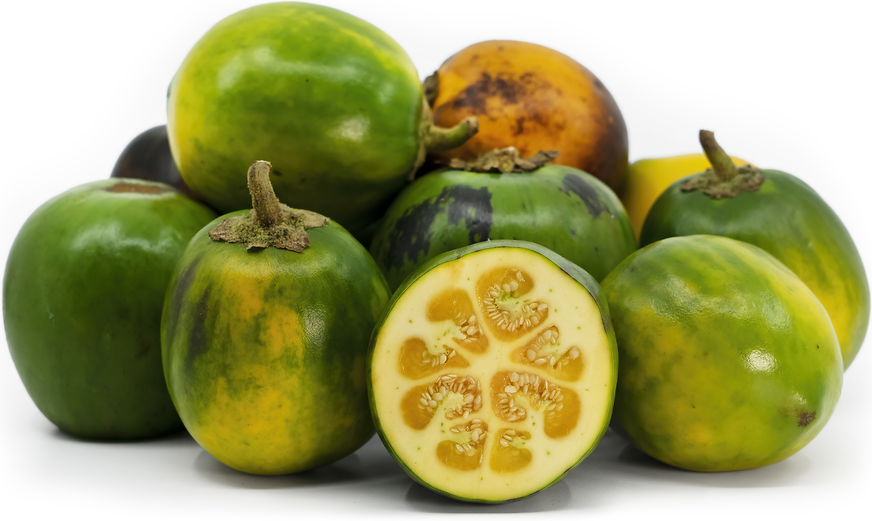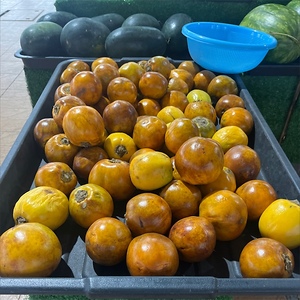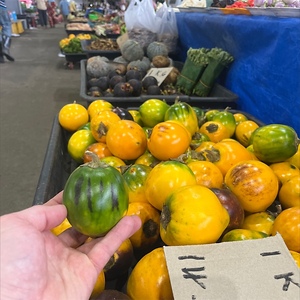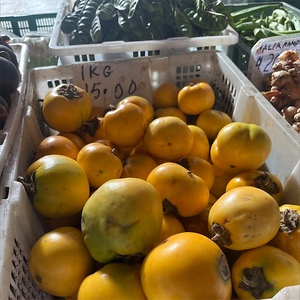


Terung Asam (sour) Eggplant
Estimated Inventory, lb : 0
Description/Taste
Terung Asam eggplants are small, round vegetables that measure about 8 centimeters long and 6 centimeters wide. They have a round, elongated shape that transitions from lime green to a bright orange-yellow as they mature. Some Terung Asam eggplants take on a burnt red-orange or dark purple hue with purple to black variegated stripes. The skin on these eggplants is typically shiny, soft, and firm but may be spotted with brown spots, giving them a slightly bruised look. Their flesh ranges from light yellow to bright yellow-orange and when cut length-wise may resemble that of a yellow tomato. When sliced width-wise, the flesh looks more like a traditional eggplant, with a firm solid outer flesh and a soft central cavity containing dozens of small white seeds. Terung Asam eggplants have a tomato-like aroma and a sour, acidic flavor.
Seasons/Availability
Terung Asam eggplants are available year-round in their native regions.
Current Facts
Terung Asam eggplants are botanically classified as Solanum lasiocarpum dunal and belong to the Solanaceae family along with chilis, potatoes, tomatoes, and bell peppers. Solanaceae is also referred to as the nightshade family and includes about twenty-five cultivated food species. Eggplants are labeled under the botanical names Solanum lasiocarpum, Solanum aethiopicum, Solanum macrocarpon, and Solanum torvum and are important crops in the Middle and Near East, Africa, Southern Europe, and Asia. Terung Asam eggplants are also referred to as Sour eggplant, Terung Dayak, Cung Bulu, and Khua Kon. They are a relatively rare variety, particularly when compared to cultivars like Scarlet, Gboma, Pea, and Japanese eggplants. Terung Asam eggplants are frequently cultivated by the Dayak people of Sarawak in hill paddy fields. Sarawak is a region of the Malaysian island of Borneo that’s located along the northwest coast. This variety was granted a Protected Geographic Indication status in 2011, meaning its reputation and characteristics are tied to their native regions in Southeast Asia.
Nutritional Value
Terung Asam eggplants are a good source of vitamin C, which plays a vital role in supporting the immune system, promoting collagen production, and enhancing iron absorption. The fiber content in Terung Asam eggplants aids digestion, supports a healthy gut, and helps maintain a balanced weight. These vegetables are packed with antioxidants, which protect the body from cellular damage caused by harmful free radicals, potentially lowering the risk of chronic diseases. Terung Asam eggplants also contain hydroxycitric acid, known for its ability to promote fat loss and suppress appetite, making it a valuable dietary aid for weight management.
Applications
Terung Asam eggplants are typically too sour to be eaten raw but are often cooked into soups, curries, and sauces. These vegetables may be cut into quarters and cooked with or without seeds. Peeling is unnecessary as the skin comes off easily when steamed or boiled. Terung Asam eggplants are sometimes used as a substitute for tamarind because they offer a similar sour flavor. One of the only times they can be eaten raw is in salads when they are immature and still green. This variety pairs well with turmeric, chili, coconut milk, garlic, and smoked meats and fish. Slices of Terung Asam eggplant can be dehydrated and kept for up to a year if stored in an airtight container. Fresh Terung Asam eggplants can be refridgerated for about a month.
Ethnic/Cultural Info
In Borneo, Terung Asam eggplants are consumed by the Dayak people. They are used in asam pedas, or sour and spicy fish dishes. In Sarawak, Terung Asam eggplants are combined with chiles, lemongrass, and onions and cooked with shrimp paste and anchovies or dried shrimp. These vegetables are also used to create sambal, a paste made from red chiles, bird’s eye chiles, shrimp paste, and calamansi lime juice. This dish is prepared with a traditional stone mortar and pestle and served with fried tempeh, chicken, or fish.
Geography/History
Terung Asam eggplants are native to the island of Borneo in Malaysia, specifically the northern region known as Sarawak. In the wild, Terung Asam eggplants can be found growing in ravines and valleys in tropical climates. They are both a foraged and a cultivated vegetable, often sown in patty fields and spotted at street markets and vendors in Borneo. These vegetables have become increasingly more popular throughout East Malaysia, Indonesia, and the Phillippines but are rarely found outside of Southeast Asia.
Recipe Ideas
Recipes that include Terung Asam (sour) Eggplant. One
| Guai Shu Shu |
|
Borneo Sour Brinjal aka Terung Dayak |
| Simple Yet Yummylicious |
|
Terung Asam Cooked with Fish |
| Petite Nyonya's Kitchen |
|
Spicy Shrimp Paste Condiment |










